Game development competitions offer significant rewards, including cash prizes, software licenses, and mentorship. Entry requirements can vary widely, influencing participation. These contests also enhance funding opportunities by connecting developers with industry professionals and investors. Understanding the components of these competitions is crucial for maximizing their impact on your game development journey.
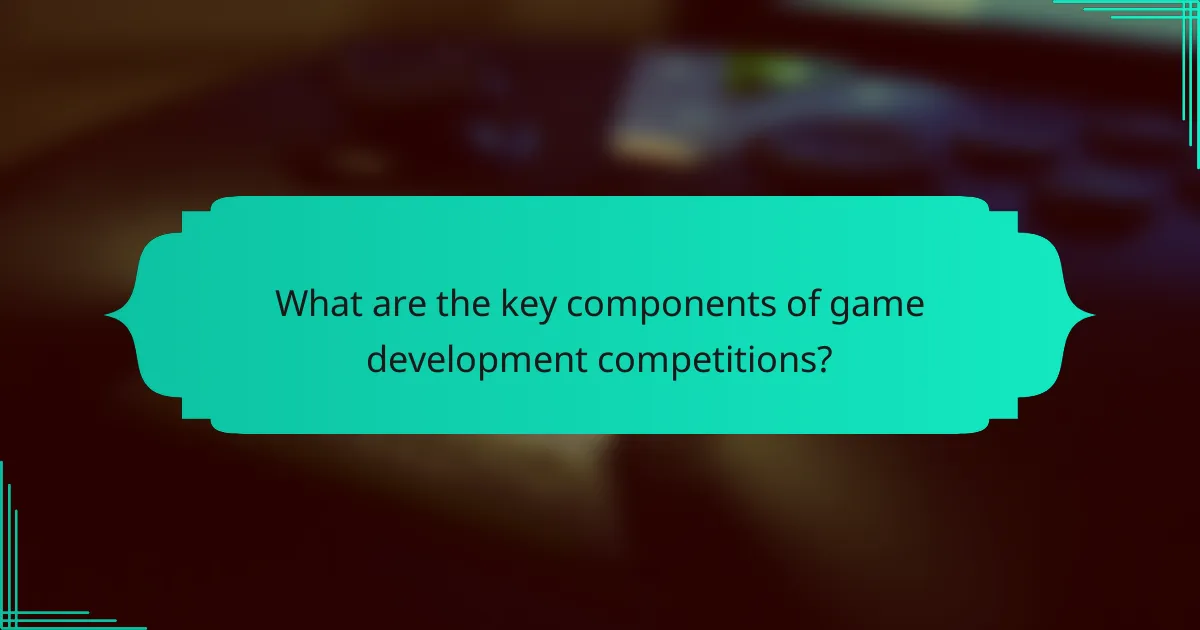
What are the key components of game development competitions?
Game development competitions feature several key components, including prizes, entry requirements, and funding opportunities. Prizes often include cash rewards, software licenses, and mentorship, incentivizing participation. Entry requirements can vary, typically encompassing team size, project scope, and submission deadlines. Competitions also impact funding by connecting developers with investors and industry professionals, fostering future project growth.
How do prizes influence participation in these competitions?
Prizes significantly enhance participation in game development competitions by motivating developers. High-value rewards attract more entrants, fostering a competitive environment. Additionally, prizes can increase visibility for participants, leading to potential funding opportunities. This dynamic encourages innovation and collaboration within the gaming community.
What are the common entry requirements across different competitions?
Common entry requirements for game development competitions include project submission, adherence to theme, and eligibility criteria. Competitors typically need to showcase original work, which may include prototypes or completed games. Some competitions require teams to have a specific number of members, while others allow solo entries. Deadlines for submission often vary, along with the need for documentation detailing the development process. Additionally, certain competitions may impose restrictions on the technology used, encouraging innovation within specified parameters.
Which platforms host the most popular game development competitions?
Popular game development competitions are hosted on platforms like itch.io, Game Jolt, and Devpost. These platforms provide opportunities for developers to showcase their skills, gain visibility, and compete for prizes. For instance, itch.io frequently hosts game jams that attract thousands of participants. Game Jolt emphasizes community engagement, while Devpost focuses on hackathons that often lead to funding opportunities for innovative projects.
How do different regions perceive the significance of these competitions?
Different regions view game development competitions as vital for innovation and funding opportunities. In North America, these contests often emphasize networking and skill development, leading to increased investment in local studios. In Europe, competitions focus on cultural representation and collaboration, enhancing community ties. Asian regions prioritize technological advancements and market expansion, driving significant industry growth. Each area’s unique approach reflects local industry needs and cultural values, influencing participant engagement and outcomes.
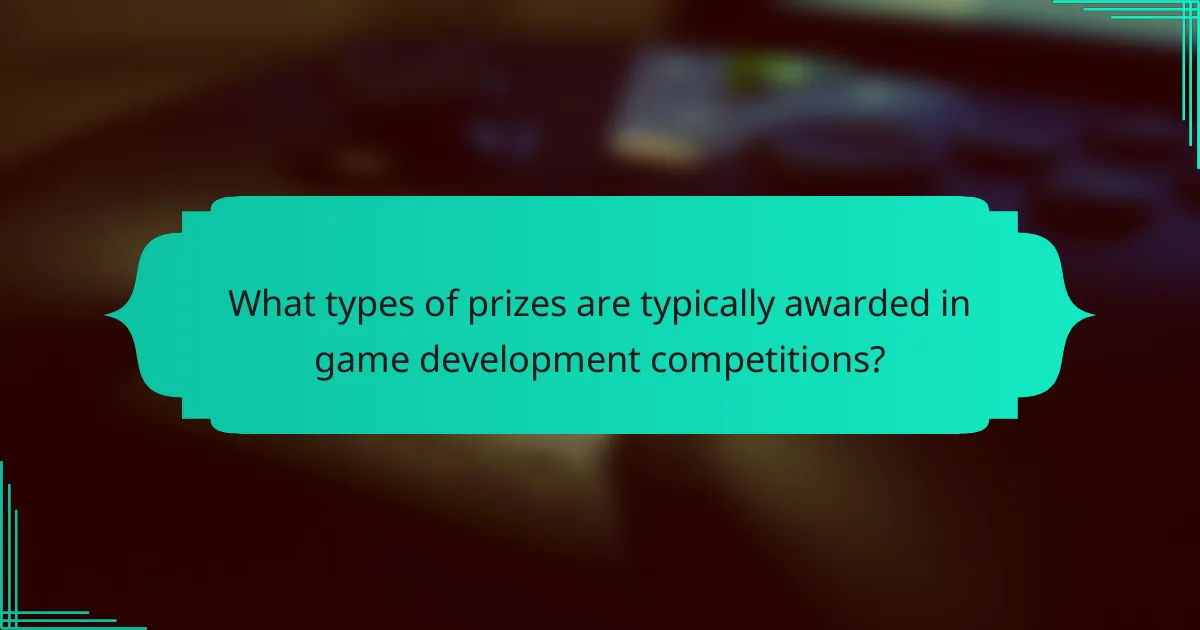
What types of prizes are typically awarded in game development competitions?
Game development competitions typically award cash prizes, software licenses, hardware, mentorship opportunities, and exposure in industry events. These prizes incentivize innovation and creativity among developers. Cash prizes can range from hundreds to thousands of dollars, while software licenses often include popular game engines or design tools. Hardware prizes may feature gaming consoles or high-performance PCs. Mentorship opportunities connect winners with industry experts, enhancing their skills and career prospects. Exposure at events can lead to networking and potential funding for future projects.
How do monetary prizes compare to non-monetary rewards?
Monetary prizes often provide greater motivation than non-monetary rewards in game development competitions. Monetary incentives directly impact participants’ financial situations, encouraging higher engagement and effort. Non-monetary rewards, such as recognition or mentorship, can foster community and skill development but may not drive the same level of competition. The choice between these rewards can influence the quality of submissions and overall competition outcomes.
What unique sponsorship opportunities arise from winning competitions?
Winning game development competitions can lead to unique sponsorship opportunities that enhance visibility and funding. Sponsors may offer financial support, mentorship, or access to resources, which can significantly impact a developer’s career. Additionally, exposure to industry leaders can result in collaborative projects or partnerships. Such opportunities can accelerate project development and increase market reach. Winning can also boost credibility, making it easier to attract further sponsorships and investments.
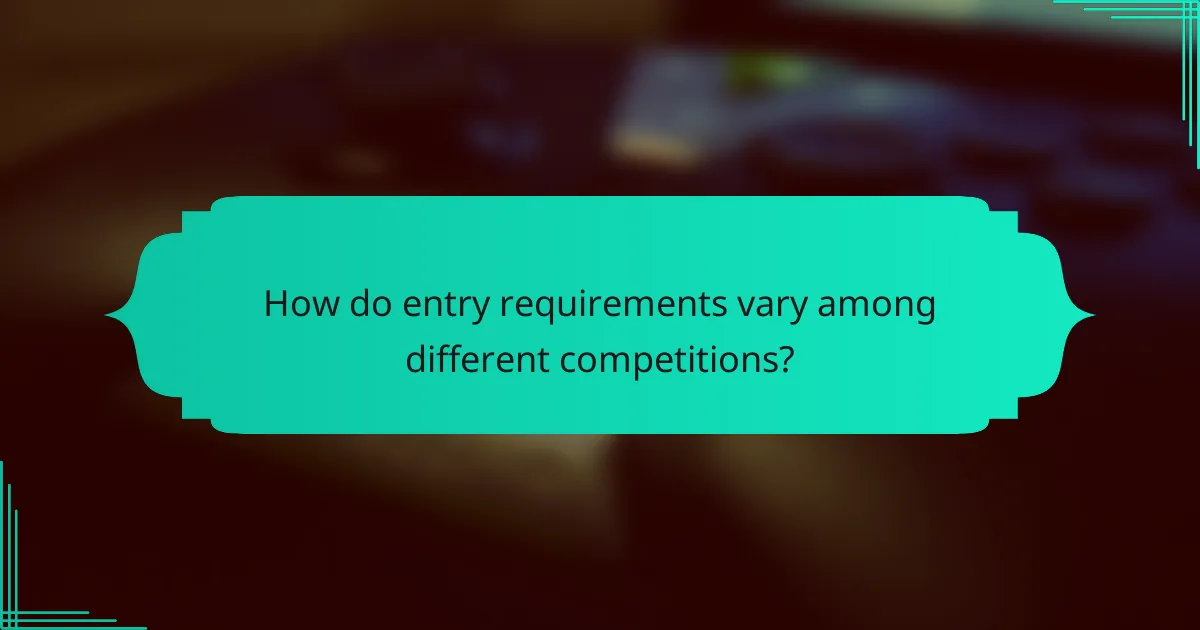
How do entry requirements vary among different competitions?
Entry requirements for game development competitions vary significantly based on the competition’s focus and scale. Some competitions require a complete game prototype, while others may accept game concepts or pitches. Additionally, eligibility criteria can differ, with some open to students and others targeting industry professionals. Prizes can include cash, mentorship, and funding opportunities, influencing the level of competition. Understanding these variations helps participants choose the right contests to enter.
What are the common eligibility criteria for participants?
Common eligibility criteria for participants in game development competitions include age restrictions, team size limits, and original content requirements. Participants often need to be at least 18 years old, form teams of up to five members, and submit games that are entirely their own creations. Some competitions may also require participants to register in advance and adhere to specific submission deadlines.
How do submission formats differ across competitions?
Submission formats vary significantly across game development competitions, impacting how entries are evaluated. Some competitions require playable prototypes, while others accept design documents or video presentations. The format influences the type of feedback and recognition participants receive, affecting their future opportunities. Additionally, specific competitions may prioritize innovative mechanics or storytelling, shaping the submission criteria.
What challenges do entrants face in meeting these requirements?
Entrants face several challenges in meeting game development competition requirements. Limited resources hinder access to necessary tools and technology. Additionally, the competitive landscape increases pressure to innovate and stand out. Time constraints often lead to rushed submissions, impacting quality. Lastly, understanding complex rules and criteria can create confusion and misalignment with judges’ expectations.
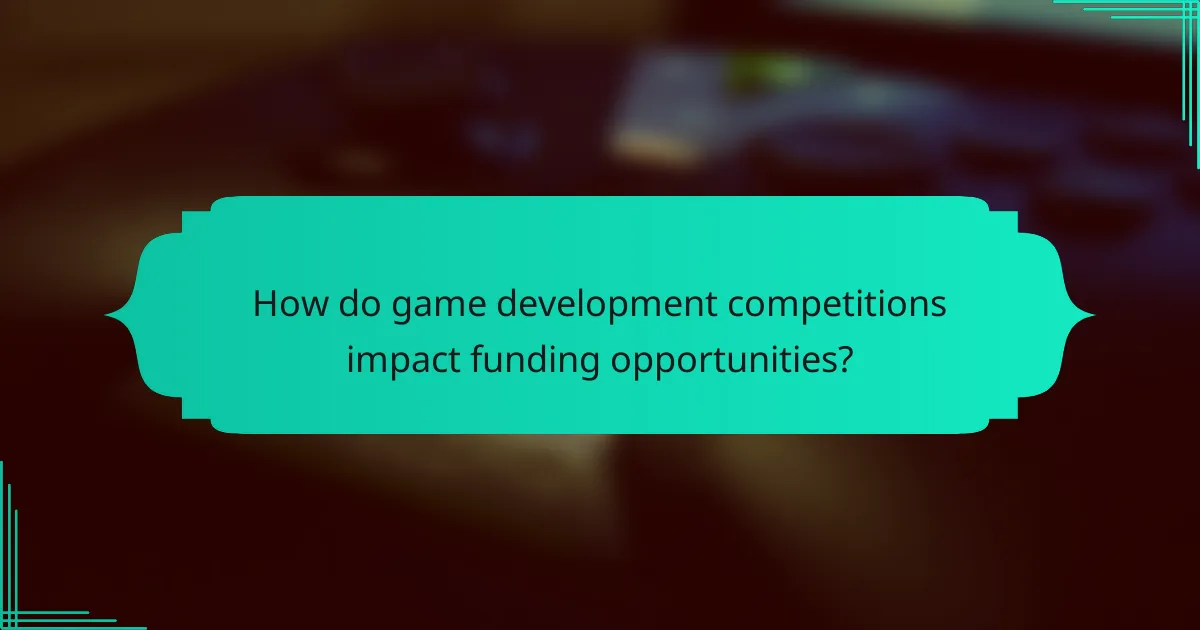
How do game development competitions impact funding opportunities?
Game development competitions enhance funding opportunities by providing exposure and networking. Participants can connect with industry professionals and investors, increasing their chances of securing financial support. Winning competitions often leads to funding offers, partnerships, and mentorship opportunities. Additionally, these events foster innovation, attracting sponsors who seek to invest in promising projects.
What role do competitions play in attracting investors to new projects?
Competitions play a significant role in attracting investors to new game development projects by showcasing talent and innovation. They provide a platform for developers to present their ideas, often leading to increased visibility and potential funding opportunities. Winning or participating in competitions can enhance credibility, making projects more appealing to investors. Additionally, competitions often attract industry attention, creating networks that can facilitate further investment.
How can winning a competition enhance a developer’s funding prospects?
Winning a competition significantly enhances a developer’s funding prospects by providing visibility, credibility, and networking opportunities. Success in game development competitions often leads to increased interest from investors and publishers. Additionally, winning can result in monetary prizes or grants, which directly support project development. The recognition gained can also attract attention from industry professionals, opening doors for collaboration and further funding opportunities.
Which competitions have historically led to significant funding outcomes?
Game development competitions have historically led to significant funding outcomes through various prestigious events. Notable examples include the Global Game Jam, which fosters innovation and networking, and the IndieCade Festival, known for showcasing indie talent and providing access to investors. The Ludum Dare competition has also been influential, offering exposure and prizes that can lead to funding opportunities. Additionally, competitions like the Game Developers Choice Awards highlight outstanding projects, attracting attention from publishers and investors alike. These events create platforms for developers to gain recognition and secure financial backing for their projects.
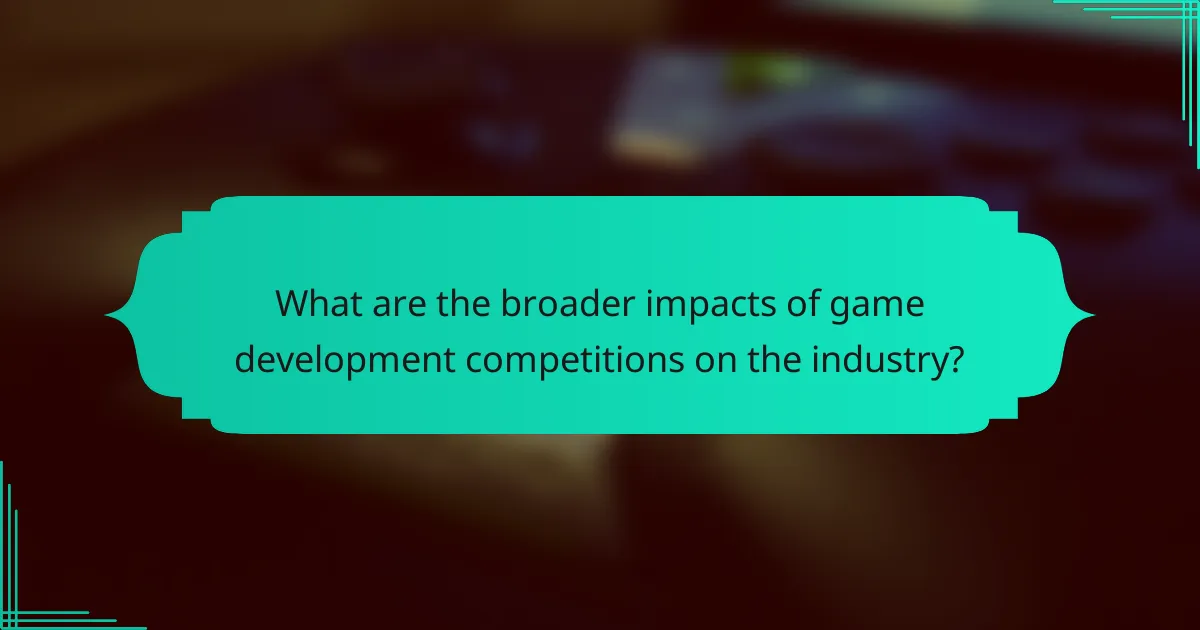
What are the broader impacts of game development competitions on the industry?
Game development competitions significantly influence the industry by fostering innovation and providing funding opportunities. These events encourage developers to showcase their skills, leading to the discovery of new talent. Competitions often offer substantial prizes, which can include cash, resources, or mentorship, motivating participation and enhancing project quality. Additionally, they create networking opportunities that can result in collaborations and partnerships, further driving the industry’s growth. The exposure gained through these competitions can attract investors, thus impacting funding for future projects.
How do these competitions foster innovation in game design?
Game development competitions foster innovation by encouraging creativity, collaboration, and experimentation among participants. These events often provide valuable resources, mentorship, and exposure, which enhance participants’ skills and ideas. Additionally, the competitive aspect drives developers to push boundaries and explore new concepts. Prizes can also lead to funding opportunities, further fueling innovative projects.
What networking opportunities do competitions create for developers?
Competitions create valuable networking opportunities for developers by connecting them with industry professionals, potential collaborators, and investors. Participants can showcase their skills, gain visibility, and receive feedback from experienced judges. These interactions often lead to mentorship, job offers, and partnerships, enhancing career prospects. Additionally, competitions frequently attract sponsors and organizations looking to discover new talent, further expanding networking avenues.
How do competitions contribute to community building within the gaming industry?
Game development competitions foster community building by promoting collaboration, networking, and skill development among participants. These events create shared experiences that strengthen connections within the gaming industry. Competitions often offer prizes that can include funding opportunities, which further incentivizes participation and innovation. Entry requirements typically focus on showcasing creativity and technical skills, encouraging diverse contributions from various backgrounds. As a result, these competitions not only enhance individual capabilities but also cultivate a supportive community that drives growth in the gaming sector.
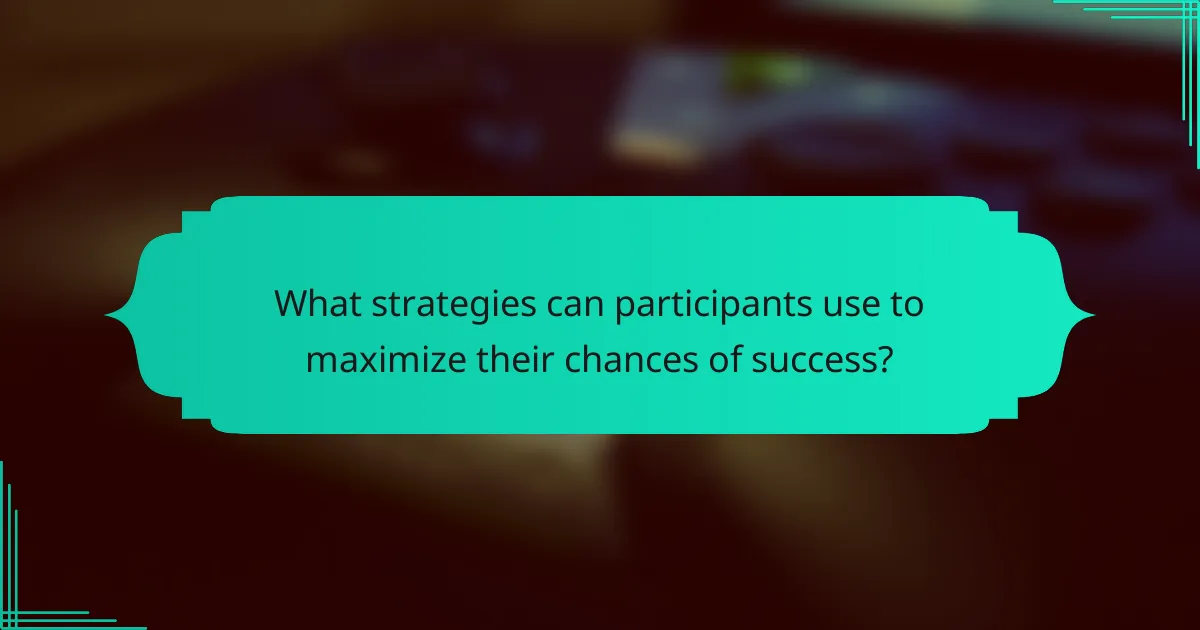
What strategies can participants use to maximize their chances of success?
Participants can maximize their chances of success in game development competitions by focusing on key strategies. Prioritize understanding the competition’s theme and requirements. Create a unique concept that stands out while ensuring it aligns with the judges’ expectations. Collaborate with skilled team members to leverage diverse talents and perspectives. Develop a polished prototype that showcases gameplay mechanics effectively. Finally, practice pitching your game to convey passion and clarity, enhancing your project’s appeal.
What are the best practices for preparing a game for competition?
To prepare a game for competition, focus on refining gameplay mechanics, optimizing performance, and ensuring a polished user experience. Start by conducting playtests to gather feedback and make necessary adjustments.
Establish clear goals for the competition, including understanding judging criteria and audience expectations. Prioritize bug fixing and performance enhancements to meet technical standards.
Lastly, create a compelling presentation that highlights unique features and gameplay elements to engage judges and players alike.
How can developers effectively market their games during competitions?
Developers can effectively market their games during competitions by leveraging social media, engaging with the community, and showcasing unique features. Utilizing platforms like Twitter and Instagram can generate buzz and attract players. Engaging with game enthusiasts through forums or live streams enhances visibility. Highlighting unique attributes, such as innovative gameplay or stunning graphics, can differentiate a game from competitors. Collaborating with influencers can also amplify outreach, driving interest and participation.
What common mistakes should entrants avoid when participating in competitions?
Entrants should avoid common mistakes like not following guidelines, underestimating time requirements, and neglecting to test their games thoroughly. Many miss the importance of originality, which can impact their chances of winning. Additionally, failing to promote their entry can limit visibility and engagement.
